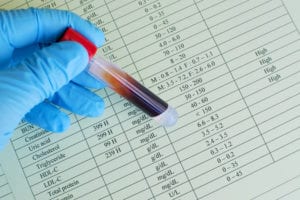Written by Jessica Patella, ND. Amla extract significantly reduced lipid profiles in study participants with dyslipidemia.
 Elevated cholesterol levels are one of the major risk factors for cardiovascular disease 1,2. Although research has shown that even when cholesterol levels are brought back down into the normal range, cardiovascular disease risk can still occur 1,3. There is a relatively new measure called the Atherogenic index of plasma (AIP), which is a ratio of the triglyceride levels to high density lipoprotein levels (HDL or “good cholesterol”) and is increased in those at higher risk of heart disease 1,3. Recent research has found supplementing with Amla can reduce cholesterol levels and AIP ratios, which is helpful for those at risk for heart disease 1.
Elevated cholesterol levels are one of the major risk factors for cardiovascular disease 1,2. Although research has shown that even when cholesterol levels are brought back down into the normal range, cardiovascular disease risk can still occur 1,3. There is a relatively new measure called the Atherogenic index of plasma (AIP), which is a ratio of the triglyceride levels to high density lipoprotein levels (HDL or “good cholesterol”) and is increased in those at higher risk of heart disease 1,3. Recent research has found supplementing with Amla can reduce cholesterol levels and AIP ratios, which is helpful for those at risk for heart disease 1.
Emblica officinalis, also known as Amla or Indian gooseberry, has been shown to help cholesterol levels in animal and pilot clinical studies without major side effects 1,4,5. It is thought that the high levels of flavonoids in Amla are helpful in reducing lipid levels 6.
The research included 98 participants (45 males and 53 females, 30-65 years of age) from South India having elevated triglyceride (>200 mg/dL), LDL-Cholesterol (>130 mg/dL), total cholesterol (>200 mg/dL) and lowered HDL (<40 mg/dL men/ <50 mg/dL women). The participants were not taking any medications, including herbs, for the management of their cholesterol 1.
The participants were randomly divided into the Amla group (n=49) or the placebo group (n=49). The Amla group took a 500 mg capsule of Amla extract twice daily (1000 mg total/day) for 12-weeks, while the placebo group had a color matched placebo pill they took twice daily for 12-weeks. All participants were also asked to adopt a healthy diet with exercise at least 4-days a week 1.
After 12 weeks, the following results were observed:
- Triglycerides were significantly reduced in 90% of the Amla group after (from 231.67 +/- 27.03 mg/dl to 177.0 +/- 60.04; p<0.0001) and in the placebo group (from 247.62 +/- 57.70 mg/dl to 210.47 +/- 65.27 mg/dl, p=0.0003)
- AIP was significantly reduced in the Amla group (from 0.43 +/- 0.14 to 0.26 +/- 0.20; p<0.0001).
- The ratio of Apo B to Apo A1 was significantly reduced in the Amla group (from 1.00 +/- 0.34 to 0.94 +/- 0.29; p=0.0419)
- Total cholesterol was significantly reduced in 73% of the Amla group (from 231.76 +/- 27.03 mg/dl to 177.0 +/- 60.04 mg/dl; p<0.0001) and in the placebo group (from 225.74 +/- 29.03 to 212.55 +/- 31.78 mg/dl; p=0.0098).
- LDL or “bad” cholesterol was significantly reduced in 53% of the Amla group only (from 139.96 +/- 19.66 to 111.53 +/- 43.22 mg/dl; p<0.0001).
Amla supplementation significantly improved cholesterol levels and ratios in participants with hyperlipidemia 1. A larger and longer-term study is warranted to confirm results and determine the mechanism of action of Amla extract. It would also be of note to determine how much change occurred due to dietary and exercise reasons since there was improvement in the placebo group for some lipid levels as well.
Source: Upadya, Haridas, S. Prabhu, Aravinda Prasad, Deepa Subramanian, Swati Gupta, and Ajay Goel. “A randomized, double blind, placebo controlled, multicenter clinical trial to assess the efficacy and safety of Emblica officinalis extract in patients with dyslipidemia.” BMC complementary and alternative medicine 19, no. 1 (2019): 27.
© The Author(s). 2019 Open Access This article is distributed under the terms of the Creative Commons Attribution 4.0 International License (http://creativecommons.org/licenses/by/4.0/) (http://creativecommons.org/publicdomain/zero/1.0/)
Click here to read the full text study.
Posted January 13, 2020.
References:
- Upadya H, Prabhu S, Prasad A, Subramanian D, Gupta S, Goel A. A randomized, double blind, placebo controlled, multicenter clinical trial to assess the efficacy and safety of Emblica officinalis extract in patients with dyslipidemia. BMC complementary and alternative medicine. 2019;19(1):27.
- Assmann G, Schulte H. Relation of high-density lipoprotein cholesterol and triglycerides to incidence of atherosclerotic coronary artery disease (the PROCAM experience). The American journal of cardiology. 1992;70(7):733-737.
- Dobiás̆ová M, Frohlich J. The plasma parameter log (TG/HDL-C) as an atherogenic index: correlation with lipoprotein particle size and esterification rate inapob-lipoprotein-depleted plasma (FERHDL). Clinical biochemistry. 2001;34(7):583-588.
- Mathur R, Sharma A, Dixit V, Varma M. Hypolipidaemic effect of fruit juice of Emblica officinalis in cholesterol-fed rabbits. Journal of Ethnopharmacology. 1996;50(2):61-68.
- Jacob A, Pandey M, Kapoor S, Saroja R. Effect of the Indian gooseberry (amla) on serum cholesterol levels in men aged 35-55 years. European journal of clinical nutrition. 1988;42(11):939-944.
- Anila L, Vijayalakshmi N. Flavonoids from Emblica officinalis and Mangifera indica—effectiveness for dyslipidemia. Journal of Ethnopharmacology. 2002;79(1):81-87.

